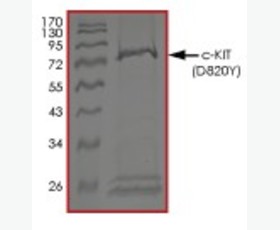Recombinant Mouse C-X-C Motif Chemokine 1/CXCL1/GRO α
| Product name: | Recombinant Mouse C-X-C Motif Chemokine 1/CXCL1/GRO α |
| Source: | Human Cells |
| Purity: | Greater than 95% as determined by reducing SDS-PAGE. |
| Buffer Formulation: | Lyophilized from a 0.2 μm filtered solution of PBS,pH7.4. |
| Applications: | Applications:SDS-PAGE; WB; ELISA; IP. |
| Storage: | Avoid repeated freeze/thaw cycles. Store at 2-8 oC for one month. Aliquot and store at -80 oC for 12 months. |
| UOM: | 100ug/50ug/200ug/1mg/1g |
| Source | Human Cells |
| Description | Recombinant Mouse C-X-C motif chemokine 1 is produced by our Mammalian expression system and the target gene encoding Arg20-Lys96 is expressed with a 6His tag at the C-terminus. |
| Names | Growth-regulated alpha protein,C-X-C motif chemokine 1,Platelet-derived growth factor-inducible protein KC,Secretory protein N51,Cxcl1,Gro, Gro1, Mgsa, Scyb1 |
| Accession # | P12850 |
| Formulation | Lyophilized from a 0.2 μm filtered solution of PBS,pH7.4. |
| Shipping |
The product is shipped at ambient temperature. |
| Reconstitution |
Always centrifuge tubes before opening. Do not mix by vortex or pipetting. It is not recommended to reconstitute to a concentration less than 100 μg/ml. Dissolve the lyophilized protein in ddH2O. Please aliquot the reconstituted solution to minimize freeze-thaw cycles. |
| Storage |
Lyophilized protein should be stored at < -20°C, though stable at room temperature for 3 weeks. Reconstituted protein solution can be stored at 4-7°C for 2-7 days. Aliquots of reconstituted samples are stable at < -20°C for 3 months. |
| Purity |
Greater than 95% as determined by reducing SDS-PAGE. |
| Endotoxin | Less than 0.1 ng/µg (1 IEU/µg) as determined by LAL test. |
| Amino Acid Sequence |
RLATGAPIANELRCQCLQTMAGIHLKNIQSLKVLPSGPHCTQTEVIATLKNGREACLDPEAPLVQ KIVQKMLKGVPKVDHHHHHH
|
| Background | Cxcl1, also called Gro, Gro1, Mgsa or Scyb1, is short for growth-regulated alpha protein. The protein belongs to the intercrine alpha (chemokine CxC) family. The N-terminal processed form KC(5-72) of the protein is produced by proteolytic cleavage after secretion from bone marrow stromal cells, and shows a highly enhanced hematopoietic activity. Cxcl1 has chemotactic activity for neutrophils, and contributes to neutrophil activation during inflammation. Hematoregulatory chemokine, in vitro, suppresses hematopoietic progenitor cell proliferation. |














